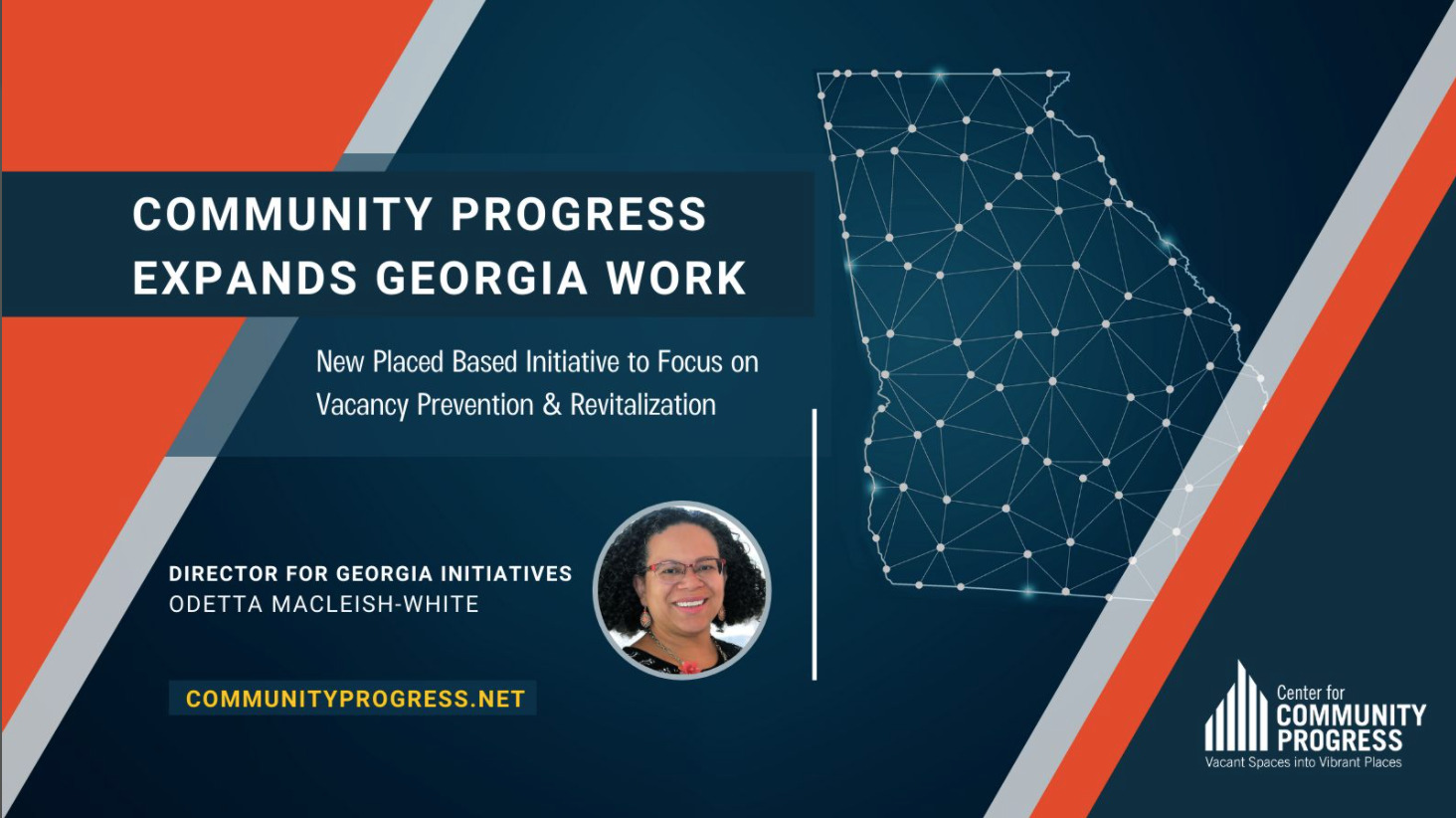Well-Known Georgia Community Development Leader Joins Community Progress’ Newly Formalized Place-Based Program
March 31, 2021

Odetta MacLeish-White to Shape Vacancy Prevention & Affordable Housing Initiative in Georgia
Washington, D.C. – March 27, 2021 – Today, the Center for Community Progress (Community Progress), the nation’s leading resource on land banking and revitalizing vacant, abandoned, and deteriorated (VAD) properties, named long-time a community development leader and the former Managing Director of the TransFormation Alliance, Odetta MacLeish-White, as Director of its new placed-based initiative in Georgia.
“Georgia stands as a long-time center for community development innovation – providing ideas, insights, and research to other states across the nation,” said Dr. Akilah Watkins, President and CEO of Community Progress.
“Since our inception, we’ve partnered with leaders to work on solutions throughout the state. We’re excited to formalize that work during this important time and onboard the proven leadership Odetta brings to champion more resident-focused programs and growth in community development.”
As Director of Georgia Initiatives, MacLeish-White will design and implement strategies to help stabilize neighborhoods and grow urban and rural communities across Georgia. Her work will include leading research, collaborating on policy development, and uniting vital partners, like land banks, land trusts and legislators, to help residents realize their community vision and fight vacancy.
Community Progress Georgia Initiative to Prioritize Statewide Partnerships to Address Vacant Properties
Community Progress has led placed-based work and technical assistance since 2010 helping communities like Detroit, Rochester, and others develop land banking, racial equity, and code enforcement tools to transform vacant and deteriorated properties into community assets.
Since 1991, 23 land banks have formed in Georgia. Today, the entities impact 23 counties, more than 30 cities and towns, and have made Georgia one of the top five highest concentrations land banks in the nation.
According 2019 research published by the Georgia Association of Lank Bank Authorities (GALBA) and the Community Progress, in Atlanta alone, vacant and distressed properties cost Atlanta taxpayers $1.65 million annually in code enforcement, clean-up, police and fire costs, and nearly $1 million dollars per year in lost property tax revenue in 2015.
 “Our Georgia Initiative will support and build on the years of work Community Progress, local organizers, and our partner nonprofits and leaders have made to grow justice in our state,” says MacLeish-White. “I look forward to connecting Georgia’s diverse set of stakeholders around vacant properties with the national resources that we need to implement racially equitable strategies for addressing vacant and abandoned properties.”
“Our Georgia Initiative will support and build on the years of work Community Progress, local organizers, and our partner nonprofits and leaders have made to grow justice in our state,” says MacLeish-White. “I look forward to connecting Georgia’s diverse set of stakeholders around vacant properties with the national resources that we need to implement racially equitable strategies for addressing vacant and abandoned properties.”
“The state of Georgia has been ground zero for many of the important conversations that have advanced the fields of land banking and community development,” said Dr. Frank Alexander, Senior Fellow and co-founder for Community Progress. “Georgia has been a natural, long-standing partner in our work and I am excited to have the Odetta’s expertise to help shape the future of our contributions and service to Georgia residents.”
For media interviews and more information on Community Progress or its new placed-based Georgia Initiative, email [email protected] or call (877) 542-4842 ext. 153.
About the Center for Community Progress
Since 2010, the Center for Community Progress has helped more than 300 communities transform vacant, abandoned, and deteriorated (VAD) properties into assets for neighbors and neighborhoods. Through offices in Michigan and Washington, D.C., Community Progress works to create a future where all people live in strong, healthy, just communities where widespread vacant properties no longer exist. For more information visit www.communityprogress.net.
Recent Press Releases
Subscribe to join 14,000 community development leaders getting the latest resources from top experts on vacant property revitalization.
